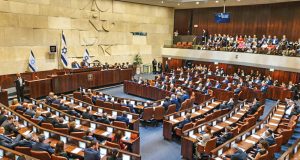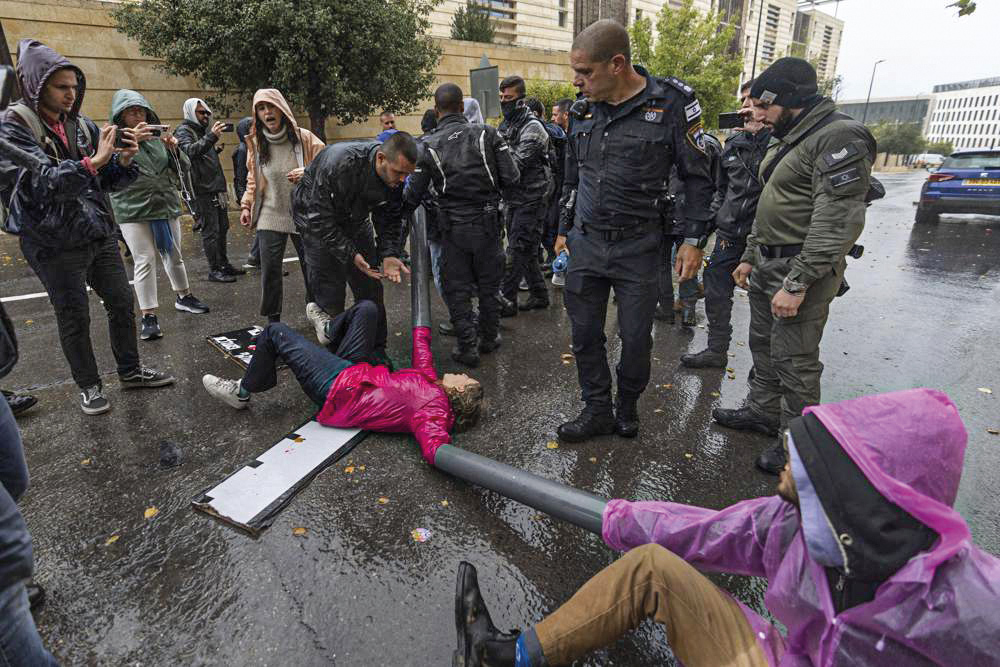|
Getting your Trinity Audio player ready...
|
By: Fern Sidman
The Knesset voted to back two key provisions of the government’s judicial overhaul plan early Tuesday morning, as was reported by World Israel News.
During a marathon session overnight which continued into Tuesday morning, the Knesset plenum voted 61 to 52 in favor of a bill which would both limit the Supreme Court’s ability to strike down laws and provide the Knesset with an override to veto such rulings, the WIN report said.
Opposition lawmakers filibustered for hours, delaying the vote, which ultimately split entirely along Coalition-Opposition lines.
The steps were the latest in a series of moves by Netanyahu’s ruling Likud coalition to reform Israel’s judiciary, the AP reported. The prime minister and his allies say the effort is aimed at reining in an activist and overly intrusive court. Critics say the drive would upend the country’s democratic checks and balances and concentrate power in the hands of Netanyahu and his parliamentary majority, the AP said.

Proponents of judicial reform in Israel have observed that the “dangerous, hysterical and extreme response from the radical left in Israel that has come in the form of raucous protests, harassment of officials as well as the use of general scare tactics and downright bullying” is effectively helping to ignite a potential civil war in an already tension filled region of the world.
“The totalitarian left, under the leadership of Lapid, Gantz and their underlings are seeking a civil war and violent confrontation in order to grab political power in Israel. They are quite cognizant, and painfully so, that the emergence of the major demographic shift in Israel translates into the left becoming irrelevant, totally marginalized and hidden in obscurity, and that is what frightens them so terribly, “ said an Israeli rabbinic figure who spoke to the Jewish Voice on the condition of anonymity.
As the left wing protests and demonstrations continue to take place in Israel, it has been reported that business leaders, legal experts and retired military leaders have joined the protests, and Israeli reservists have threatened to stop reporting for duty if the judicial overhaul law passes.
The two provisions were passed in their first reading, and will now be sent back to the Knesset’s Constitution, Law and Justice Committee, headed by MK Simcha Rothman (Religious Zionist Party), one of the architects of the judicial reform plan, as was reported by WIN.
Once the committee has completed its hearings on the bill and finalized the details, the legislation will be sent back to the Knesset plenum for its second and third votes, after which it will become law. WIN reported that if passed in its present form, the bill would bar the Supreme Court from exercising judicial review over any of Israel’s 13 Basic Laws or amendments to the Basic Laws.
Furthermore, the bill requires that in order to exercise judicial review over a standard law, the court must convene all 15 justices, with at least 80%, or twelve justices, voting to strike down the law, as was reported by WIN.
Once struck down, however, the Knesset can vote to override the court and restore the law, with at least 61 MKs voting to override. WIN also reported that Yisrael Beitenu party chief MK Avidgor Liberman slammed the government after the vote, predicting it would lead to the restoration of the 2017 ultra-Orthodox draft law. “Override Clause IN – sharing the burden OUT,” Liberman tweeted.

“We will not allow the sacred values of ‘sharing of the burden’ and ‘the people’s army’ to be overrun and we will continue to fight to keep the State of Israel Jewish, Zionist and liberal,” promised Liberman who has publicly admitted that he holds an ardently secular point of view of Israeli society.
WIN reported that earlier, on Monday night, the Knesset voted 61 to 51 to approve the first reading of the Incapacitation Law, which would bar the Attorney General from declaring a prime minister unfit to serve in office. The AP reported that the bill that was passed would allow the legislative branch of Israel’s government the authority to declare a prime minister unfit to rule only for physical or mental reasons.
On Tuesday, the AP reported that hundreds of Israeli writers, artists and intellectuals called on Germany and Britain to cancel upcoming visits by Israeli Prime Minister Benjamin Netanyahu, saying his plan to overhaul Israel’s judicial system has put the country on a destructive course.
Netanyahu and his coalition partners have said that the plan is a long-overdue measure to curb what they see as outsize influence by unelected judges, the AP reported.
Tens of thousands of Israelis have taken to the streets over the past two months to protest the sweeping overhaul. The AP reported that the size of the protests last week were so large that Netanyahu was forced to take a helicopter to the airport in order to catch a flight for an official visit to Italy.
The AP reported on March 9th that the demonstrators made blocking Netanyahu’s airport route last week a centerpiece of their efforts with the optics focused on the Israeli leader having to make alternate travel plans a win for the partisan protest movement.
The helicopter ride, while avoiding snarling traffic triggered by the protest, was reported in Israel’s mainstream media as burnishing Netanyahu’s reputation as being out of touch with Israelis at a time when the economy is slowing and the country finds itself torn apart over the government’s plan, the AP reported.
Israel’s figurehead president, Isaac Herzog, who has been trying to mediate a compromise between Netanyahu’s allies and the opposition, appealed for a solution in a televised speech last Thursday in Israel, the AP reported. “What is happening here is a tragedy,” he said as protests continued.
Herzog, whose role as president is supposed to be as a unifying force and largely above politics, said the draft promoted by Netanyahu should be dropped immediately. “It is wrong. It is destructive. It undermines our democratic foundations,” he said, according to the AP report.
Herzog insisted that weeks of behind-the-scenes talks had brought the sides closer to an agreement, the AP reported. “History will judge you. Take responsibility, now,” he said.
High-tech leaders, Nobel-winning economists and prominent security officials have spoken out against judicial reform and military reservists have threatened to stop reporting for duty and even some of Israel’s closest allies, including the U.S., have urged Netanyahu to slow down, the AP reported.
The report in the AP also indicated that in a letter addressed to the German and British ambassadors in Israel , some 1,000 Israeli figures said Tuesday that their country is in the midst of the most extreme crisis in its history and that Netanyahu is trying to turn the country into a “theocratic dictatorship.”

“In the face of Mr. Netanyahu’s dangerous and destructive leadership, and in light of a vast democratic civilian resistance against the destruction of state institutions by undemocratic law-making, we are asking that Germany and Great Britain swiftly announce to the defendant Netanyahu that his planned state visits to your countries are canceled,” reads the letter, the AP reported. “If these visits go ahead as planned, a dark shadow will hang over them.”
The letter was signed by internationally acclaimed author David Grossman, novelist Dorit Rabinyan, Oscar-nominated director Uri Barbash and scores of academics, business figures and professionals, according to the AP report. Netanyahu is scheduled to meet German Chancellor Olaf Scholz on Thursday in Berlin, where Israeli expats say they are organizing a large protest against their visiting prime minister.
Israel National News reported on Tuesday that the demonstrations against the judicial reform measures are going up a notch and spreading to Haredi communities in Israel as well. For the first time, protesters against the reform bill made plans to demonstrate outside the home of a haredi MK, with the first one being MK Moshe Gafni (United Torah Judaism).
The demonstration was scheduled to take place on Tuesday evening at 7:30 p.m. outside Gafni’s home in Bnei Brak, INN reported.
The demonstrators explained that the demonstration “will kick off a large-scale move against the involvement of the haredi Knesset members in promoting the laws, led by Gafni, who recently called to ‘take down the Supreme Court’ and heavily promotes the legislation of the Override Clause,” INN reported.
They added that they “expect the Israel Police to prepare accordingly” and allow them to exercise “their freedom of expression and the right to protest outside the home of Knesset member Gafni, while making sure to maintain the safety of the demonstrators.”
“Israel is on the verge of becoming an autocratic country. The current government is trying to destroy our democracy, and actually destroy the country,” said Savion Or, a protester in Tel Aviv, as was reported by the AP last week.
Offering her observations of the growing friction taking place in Israel over the judicial reform legislation, Dr. Phyllis Chesler, an outspoken advocate for Israel, and a tireless champion of Jewish rights around the world said in a statement to the Jewish Voice on Tuesday that, “As anti-Semitism in the West keeps rising; as physical, even murderous attacks on visible Jews both in galut and in Israel keep rising; as more and more Israelis, including Israel’s President are being treated shamefully; as more and more Jewish students and professors are being harassed, even persecuted—what is going on in Israel right now is very dangerous, beyond disheartening. There are very serious people on both sides of this impending civil war.”
As the author of over 16 scholarly books and tens of thousands of articles on subjects ranging from second wave feminism to the thorough examination of “The New Anti-Semitism”, Dr. Chesler added, “The secularists/modernists/atheists are terrified lest they be subjected to religious law and prejudices about women, minorities, Arabs. They do not wish to live in a theocratic and misogynist state. They genuinely fear that their civil rights will be lost. The religious nationalists believe that only those who are God-fearing can save the Jews; they are focused on Jewish survival in an increasingly dangerous neighborhood and world. Iran is uppermost on their mind, plus the Arab terrorist attacks, the world’s media misrepresenting reality, as well as the unending anti-Israel resolutions at the United Nations. The noose is tightening, the Jew of the world is now defamed everywhere.”
In a heartfelt plea for peace and harmony to prevail at this critical juncture in the history of the Jewish nation, Dr. Chesler said, “In the name of democracy, the most uncivil protests have been taking place against a democratically elected government whose views the protestors fear and do not share. Now is the time for unity and compromise. If not now—when? We have lost our nation before because of sinat chinam, unwarranted hatred of one another.”
Dr. Chesler also took note of the fact that “for a long time now, many American Jews have identified themselves as being in opposition to Israel for any number of reasons. However, now, what was once a genuine disagreement on the issues has become a chasm, a deep and dangerous division. Israel is so important to Jews that each Jew wants to see it in their own image and not in anyone else’s image. “ She then queried: “How about in God’s image? What happened to our being a nation holy to God, a people in God’s image?
In an article entitled, “Israel’s Judicial Reform Plan Explained” that appeared on the Israel National News web site on Tuesday, written by David Rosenberg, he says, “The rapid expansion of judicial activism over the past two decades sparked a backlash, particularly on the Right, against not only the court’s use of judicial review, but a whole host of long-standing issues, including the composition of the court, and the role justices play in appointing their own successors.”
Rosenberg added that, “Israeli judges are appointed by a nine-member committee, which includes two ministers, two Knesset members (traditionally one of which comes from the Coalition and the other from the Opposition), two members of the Israel Bar Association, and three Supreme Court justices.
That has given the five non-elected officials on the committee a de facto veto over court appointments, though a 2008 reform expanded the government’s influence somewhat, requiring a seven-vote super majority to confirm nominees.
Over the past two decades, faith in the Supreme Court has declined significantly, with a majority of Israelis believing the court’s justices are heavily influenced by their own political views.”
In his exceptionally well researched article, Rosenberg said that, “a 2019 Israel Democracy Institute poll found that 59% of respondents, including both Arabs and Jews, say the justices’ professional decisions are heavily influenced or significantly influenced by their personal political views, compared to just 32% who say their rulings are either not influenced by their views at all, or are only somewhat influenced.
Nor has the decline in trust been confined to the high court. A 2021 poll by the University of Haifa found significant declines in trust across the board for Israel’s judiciary.”
Rosenberg added that “Israelis gave the judiciary an average score of 3.25 on a 1-to-5 scale in 2016, but that figure fell to 2.67 by 2020. Trust in the Supreme Court fell from 3.18 in 2016 to 2.74; the average level of trust in the Attorney General fell from 3.05 to 2.53; and trust in the state prosecutor fell from an average of 3.11 to 2.5. “
(Sources: AP, worldisraelnews.com, israelnationalnews.com)




